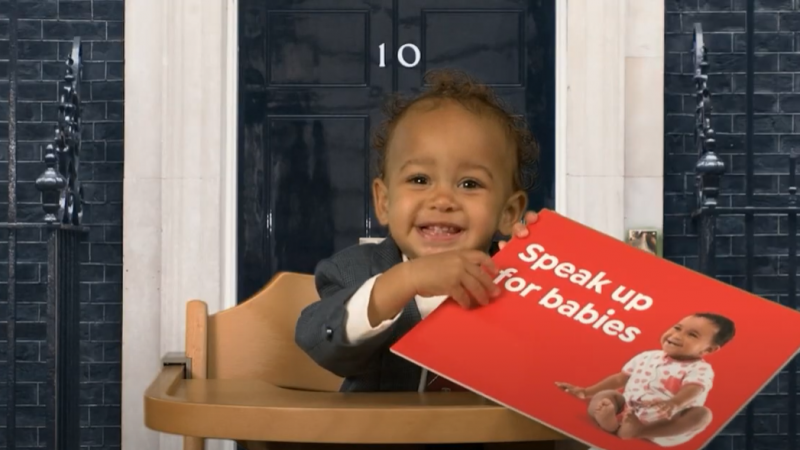
SPONSORED POST
The United Kingdom is facing an early years crisis. If it’s not addressed, we will feel the consequences for generations to come. Increasing numbers of toddlers are missing key developmental targets, and mental health conditions in children are on the rise.
Rather than early intervention that prevents and averts, services only kick in later, when problems have set in.
At least one in ten babies in the UK lives in fear and distress, according to government estimates. These babies are scared and overwhelmed by disrupted relationships with their parents or carers.
Support lacking to tackle early years crisis
Without help, they are more likely to develop mental health conditions in childhood. Yet almost three quarters (73%) of new mothers said they had not been given advice on building a relationship with their baby throughout their pregnancy.
Our Freedom of Information requests reveal a postcode lottery of mental health services for under 2s. They show the NHS principle of supporting health ‘from the cradle’, is just not reality in most parts of the country.
As the Royal College of Psychiatrists point out, effective public health interventions do exist, but there is a yawning implementation gap.
Babies don’t vote of course, so too often they are overlooked during elections. So this Infant Mental Health Awareness Week, we are asking MPs and candidates of all parties to ‘Speak Up For Babies’.
The first 48 months are vital for development
The first 1,001 days of life – from conception to two years old – is a crucial stage of brain development. Trauma and adverse experiences during this time deeply affect a child’s early development, and later, their mental and physical health.
As Gordon Brown wrote recently – the first 48 months are more consequential for a child’s development than the next 48 years.
This means the needs of babies born today cannot simply be put on ice until the economy is better. Babies are only babies for a limited time. Getting early years policy right from the get-go is fundamental to realising Labour’s ‘opportunity mission’.
The cost of inaction is far greater than the cost of action
The cost of not acting is huge, financially and in terms of lost opportunity. UNICEF, the World Bank and the World Health Organisation Nurturing Care Framework states that investing in the period from conception to three years old is “one of the most efficient and effective ways to help eliminate extreme poverty and inequality, boost shared prosperity, and create the human capital needed for economies to diversify and grow.”
But since 2010, investment in the early years has declined, while public spending on later stage interventions has increased. It currently costs the UK £16 billion every year to address problems that could have been avoided with early years intervention.
Services for at-risk babies are scarce
Services are simply too scarce. There are just 38 parent-infant teams in England when an estimated 400 teams are needed to support every baby at-risk. The health visiting workforce has decreased by more than 40% since 2015.
Local authority cuts have fallen heavily on vital voluntary and community sector services like Home-Start. Charities like ours who work with babies and families, are keen to see a whole-system approach, driven by an ambitious cross-government strategy.
Published in January 2024, Labour’s Child Health Action Plan includes a commitment to “tackle the crisis in children and young people’s mental health services”. However, the proposals as they stand, do not reach babies.
The plan focuses on later, school-aged interventions. Labour’s promise to increase the number of health visitors by 5,000 is part of the solution. But we also need a clear commitment to support every vulnerable baby, regardless of where they live: A national target for the NHS to support 60,000 babies over the next five years.
Major parties need clear pledges on this
In the absence of a clear pledge from any major party to prioritise babies, we have created our own ‘party political broadcast’ on behalf of babies. But while the film may make you smile, the problems facing babies across the UK today couldn’t be more serious.
With the election looming, we want politicians of all parties to commit to #SpeakUpForBabies. It’s an urgent problem – our children are being left behind.
Supporting babies is an issue of social justice as it underpins equal opportunities, but it also makes good economic sense. As the ‘Baby Prime Minister’ says in our film, “it’s the economy stupid”.




More from LabourList
A gory night for Labour
‘SEND reforms are a crucial test of the opportunity mission’
Delivering in Government: your weekly round up of good news Labour stories